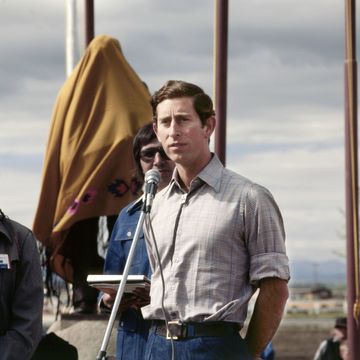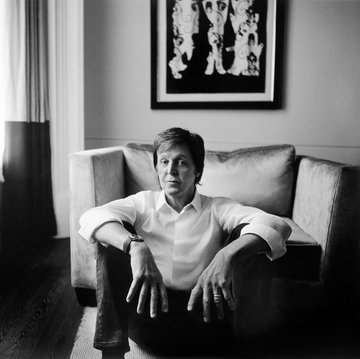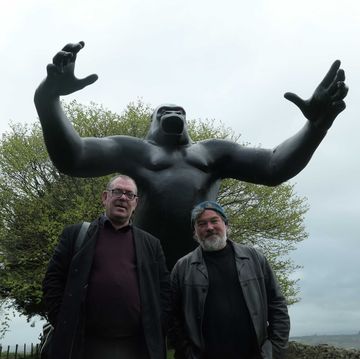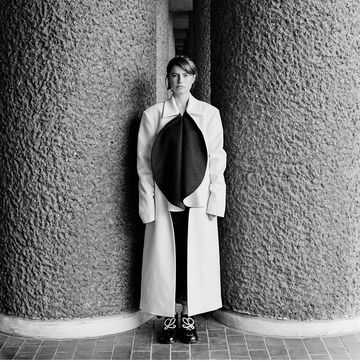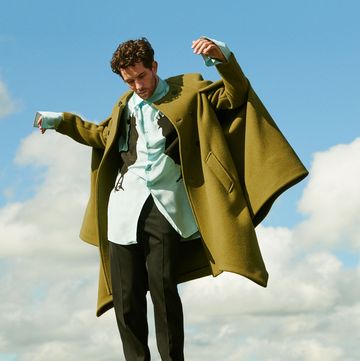For Christmas this year, it's a near certainty you'll receive a book written by JA Hazeley and JP Morris. Their names will not appear anywhere on the cover, but the satisfyingly stiff tactility and faintly arboreal whiff of the Ladybird imprint will be unmistakable: they have been made the same way since World War Two, when rationing required that they be made from one folded sheet of 40in x 30in paper.
The title of the book will say a little about what the gifter thinks of you. If they don't know you so well, perhaps it's a Secret Santa present, it might be neutral, broadly affectionate: The Ladybird Book of the Hipster or 'How it Works': the Dad. It may well nod to an interest of yours: 'How it Works': the Dog, The Ladybird Book of Mindfulness, The Ladybird Book of the Shed. If you happen to unwrap The Ladybird Book of the Mid-Life Crisis, and you've recently bought tickets for next summer's Glastonbury and are contemplating at age 43 getting your first tattoo, then your private existential malaise is probably more discernible than you figured.
But no doubt you, or someone you know, will be given one of these "Ladybird books for grown-ups". They are the publishing phenomenon of the minute: the 17 comic titles have sold more than two million copies since they were launched this time last year. 'How it Works': the Husband was 2015's Christmas number one and there was a national shortage of the books during the last festive season after migrants in Calais jumped on the truck carrying new stock and it was impounded. And it's not just Christmas, either. For much of this year, Hazeley and Morris books have squatted in up to eight out of 10 spots on the hardback bestseller chart. These are numbers that Jamie Oliver would eye jealously.
So, who are — to give them their full, published identities — JA Hazeley, NSFW and JP Morris, OMG? The books themselves give little away. In small print in 'How it Works': the Dad, it notes that they were previously authors of A Man, a Plan, a Canal: Colonic Irrigation; The Ladybird Book of Mindfulness reveals that they are also responsible for TV's Fiftiest Great Sausage Moments. But aside from that, there's no photograph, no information supplied. Are those even their real names? Is it one of those weird situations where only their agent and one person at the publishers know their true identity?
No. This is not one of those articles. In about 14 seconds of Googling, you can find out that they are Jason Hazeley and Joel Morris. They are men in their mid-forties, who were school friends in Chelmsford, Essex and now live in London with partners and children.
Within a minute, it will also become clear that they are far from overnight successes: for the past 25 years they have been comedy writers, their names flashing by in the end credits for many of the funniest shows on television: notably Charlie Brooker's Wipe series, That Mitchell and Webb Look, Murder in Successville, The Armstrong and Miller Show and Miranda. Before that, they were half of the beloved Framley Examiner, the spoof local newspaper that appeared online and was the closest Britain got to The Onion, and authors of a linked book on offbeat tourist attractions, Bollocks to Alton Towers.
The pair's kinship with Brooker, who has been a friend since the early Nineties, is especially strong. They are the main writers on his untouchable review of the year show, as well as working with him on the cop-drama parody A Touch of Cloth, the BBC satire How TV Ruined Your Life and most recently Cunk on Shakespeare. When Diane Morgan's Philomena Cunk looks doe-eyed at an expert on the history of medicine and asks him, "Why aren't there more songs about doctors?" the question was probably written by Hazeley and Morris.
"They have an uncanny ability to toss out lines that make your brain scream at your laughing muscles," says Brooker. "They regularly come up with lines for the Wipe shows which I then read out and people assume were mine, which is brilliant news for me, obviously. Describing Ed Miliband as resembling a 'frightened young violinist of the year' is just one random example that comes to mind. Right now we're working on a script for a Philomena Cunk Christmas special: they write their bits, and I write my bits, and then it all gets woven together, and I defy you to tell who wrote which bit — although if you're laughing it was probably theirs, the cunts."
On a recent Wednesday afternoon, I meet Hazeley and Morris in a pub called the Edgar Wallace, just off the Strand, to discuss their recent solo success with Ladybird. How it has changed them, what they have bought with the royalties, and so on. But they seem a little bemused, and slightly appalled, by the idea that their lives might have changed or be about to. "Weirdly, we got recognised today — the first time ever," says Hazeley, who has corkscrew hair and big eyes that widen to saucers when he reaches a punchline. "We were sitting at a table doing some work and a guy came over and said, 'Sorry, are you the guys who wrote the Ladybird books?' And we said, 'Yeah… How the fuck did you know that?'"
The general vibe of The Edgar Wallace is probably not a million miles from the inside of Morris and Hazeley's heads. The pub is named, a plaque outside informs you, after the prolific British writer and war correspondent who wrote hundreds of novels, almost 1,000 short stories and was the creator of King Kong, though he died before the film was made. The interior is an homage to its eccentric patron: it is crammed with breweriania and cigarania from the Sixties and Seventies and every inch of the ceiling is covered in beer mats. On the way to the toilets, you pass posters revealing winners of "The glove wearer of the year" competition. Hazeley and Morris fell in love with it when they came in for the second time and the barmaid said, "The usual, boys?"
"People keep saying to us, 'Where did you get the idea to bring back Ladybird books from?'" says Morris, who has rectangular glasses, neat musketeer facial hair and a Mastermind-level knowledge of the Richard Briers Eighties sitcom Ever Decreasing Circles. "Or they'd say, 'It's really nice to remember Ladybird books.' And we thought, 'Oh, you'd forgotten them?' Because we lived with them and collected the artwork and collected the books since we were kids. As adults, when we went to a charity shop, we'd go and buy a Ladybird book. We've always been people who curated and collected old stuff and liked old graphics and things."
"It's not nostalgia," clarifies Hazeley, sipping a pale ale. "It's fetishisation, I suppose, of certain sorts of subject matter."
After years of trying and failing to get their own sitcoms and sketch shows off the ground, reviving Ladybird proved to be remarkably straightforward. Hazeley and Morris sent a pitch to a contact at Penguin, which now owns Ladybird and with whom they had enjoyed a modest success with Bollocks to Alton Towers. By the end of the day, the writers had access to the 12,000-strong archive of original illustrations to mock up some spreads for consideration.
"The first one we wrote was The Hipster, which came out so quickly, so finished, there wasn't anything else to do with it," says Hazeley. "It was there, it arrived, fully formed." Finding images to go alongside the text did not take long, either: it turns out that almost anything retro or vintage-looking — a heavily bearded Arctic explorer, for example, or a man in a radiation suit mixing chemicals — could feasibly be a hipster. The characters were given carefully chosen and often very funny names, such as Ned the Third and Tiswas, which would become a feature of all the titles.
The new books copied the form of the originals: 56 pages, small enough to fit in a child's hand, a full-page photo-realistic colour illustration on the right to catch the eye, text on the left. "The voice was really important," says Morris. "We wanted it to be Douglas Adams, Kurt Vonnegut-y, like an alien observing from great distance. That Ladybird authority puts you hovering above mankind: 'you puny humans' kind of voice. It's the voice used in those public information films, sex education films, we all know it."
There has subsequently been a rumble of controversy since artist Miriam Elia claimed the idea was stolen from her; the satirical website Scarfolk has also parodied Ladybird books. But for Morris, the distinction is that he and Hazeley actually set out to "become" Ladybird authors. "And by being Ladybird authors, we have to behave like Ladybird authors: we can't swear, we can't put drugs in, we can't put sex in," he says. "Ladybird pastiches go back ages. The earliest one we found was 1960, the internet is full of them. This joke of re-contextualising old images is what Glen Baxter used to do. It's got a lot of history, it's a pretty standard gag. So, the question is how you find the joke within it. And what joke you choose."
"We did think, 'This is a helluva good idea,'" recalls Hazeley. "We said in our initial email to our man at Penguin that we thought this could do really well, and that we could sell as many as Bollocks to Alton Towers, which sold 60,000 books: 'That would be great, wouldn't it?'"
He shakes his head, "We've sold over two million now, which is fucking dizzying."
The original batch of eight titles, including The Ladybird Book of Dating and The Ladybird Book of the Hangover, came out in November 2015. But the success was far from pre-ordained. None of the supermarkets placed big orders for the books; Waterstone's planned not to take them until Tom Weldon, the CEO of Penguin Random House UK, personally contacted James Daunt, the retailer's managing director. The reason the books tipped, Hazeley and Morris believe, is because of support from independent bookstores and plain word of mouth.
"The nicest feeling was the first day the books came out, I snuck down to a bookshop and stood by the table they were on," says Morris. "As a comedy writer you have no audience, so I stood by the biographies and watched people pick our books up, then laugh out loud and hand them to a friend. Which meant, 'Oh, you've recognised something.' We like laughs, we like a physical reaction. I hate comedy writing that tries to make you wryly smile. I want a laugh.
"A lot of television at the moment is really good, but it makes people smile," he continues. "And when it's belly laugh stuff, I'm still really proud that usually we're involved. We can't necessarily do astonishingly moving coming-of-age dramas or pinpoint observations about how awkward weddings are, that's not what we do. But we can definitely do snort-tea-down-your-nose jokes."
For the comedian David Mitchell, it was a high-impact collision of offbeat writers and niche material. "I think the thing Jason and Joel have done most brilliantly most often is parody," he says. "That's certainly how they started — with the Framley Examiner — and what made the new Ladybird books so successful. They have a gift for mixing the well observed with the surreally inventive. Which isn't to say they haven't written lots of great non-parodic sketches: I particularly remember one they wrote for That Mitchell and Webb Look about the Romans in Pompeii coming up with the idea of recycling as 'a devotional thing' in the hope of placating the gods/volcano. But I think inventive parody is what they're absolutely best at."
Perhaps the most startling aspect of the "Ladybird books for grown-ups" series is that they are so reliably funny — in contrast to many impulse-purchase "humour" books. Often the comedy comes from the juxtaposition of the text with an incongruous image: for example, in 'How it Works': the Dad, a picture of American soldiers, presumably in Vietnam, is faced by text about a dad watching a DVD with his kids on Mother's Day that reads, "The girls wanted to watch Frozen but Lee has already seen that twice." Or in The Ladybird Book of the Mid-Life Crisis, which has an old man with his arm round a young woman that came from the 1968 title Beauty and the Beast and was titled "Beauty says goodbye to her father". Now the line opposite is: "As long as Phil avoids making cultural references from before 1990, never reveals he has a blueyonder e-mail address and tries not to have a heart attack, he and Megan have a great future."
"I think that people are sometimes dismissive of comedy books because there are so many rubbish ones out there," says Charlie Brooker. "But there are flat-out brilliant books from The Goodies, the Pythons, the Spitting Image team, the Young Ones team, and so on. The Meaning of Liff by Douglas Adams and John Lloyd is superb. I'd put Jason and Joel's Ladybird books right into that tradition of 'British comedy books which are far funnier and cleverer and more lovingly assembled than they needed to be'. The idea is so irresistible they could've just slung the contents together and sat back counting the quids. But no, it's been made for love. They've loved putting this stuff together. There's genuine affection and enthusiasm there and it comes across."
Calling a title a "Christmas book" can seem like an insult now, but Hazeley and Morris hope they are part of the tradition that Brooker referred to. "One of the best bits of Christmas, like watching the James Bond movie and the big box of Quality Street, is the book," says Morris. "People laugh at it, it's sociable, you share it. And it goes in the toilet. A novel you read on your own, and at the end of it, you close it and you might feel nervous about recommending it to a friend. But The Viz Annual, the Profanisaurus, those books they are social and they are shared, they brighten up Christmas as much as Morecambe and Wise did."
Before Ladybird landed, Hazeley and Morris were in dire need of a hit. As 2015 went on, they were involved in a run of projects that were commissioned, slated to shoot and then cancelled: a sitcom for Channel 4, a film for BBC4 and an eight-part mock-documentary for BBC World all collapsed in advanced stages. "We'd been doing this for 20-odd years and we both had our heads in our hands," says Morris.
Hazeley adds, "The thing is you get paid for them all, but they never get made, so I can pay the bills, but I just don't seem to be advancing at all. At all."
"No one's listening to me," says Morris. "No one's laughing."
"There was a point last year when you were starting to talk about giving it up," says Hazeley, looking at his partner. "You were having a real existential crisis about it."
Some of this ennui fed into The Ladybird Book of the Mid-Life Crisis, which both Morris and Hazeley consider one of their favourites. One joke is about a man — tellingly called Jason — who goes into a funk at B&Q after seeing a pot of boat varnish. He's never wanted to own a boat, "but now, not owning one is all he can think about". "The Mid-Life Crisis for Ladybird is the most autobiographical book written by anyone ever," says Morris. "Including actual autobiographies. It's more autobiographical than David Niven's The Moon's a Balloon."
Presumably now, with the seven-figure sales, and in excess of £11m made for Penguin, owning that boat is not actually too fanciful? "No boats," muses Hazeley. Morris chips in, "Boat-free. It's not money in that kind of thing. It's only publishing."
"I have treated myself to two original pieces of Ladybird artwork, which I bought from Rowland Rivron of all people, at that table over there," says Hazeley, gesturing to the far corner of the Edgar Wallace. "And I've bought a suitcase and a triangular R Whites Lemonade bin that cost me £500 on eBay. My grandfather had an ice-cream shop in Cranham, near Upminster, and outside he had a triangular R Whites bin, so I've got a prop from my grandfather's shop now sitting in my garden."
The "clutter" and "furniture" of their childhoods is a touchstone for both Hazeley and Morris, and they think it has been fundamental to the Ladybird revival. Unlike today, when the must-have toy in the playground changes monthly if not sooner, the period that both men grew up in — the Seventies and Eighties — was much more static. There were only three TV channels so we all watched the same shows. Everyone knew Rubik's cubes, Scalextric, Matchbox Street Racers, Mr Frosty and space hoppers.
"If you grew up around that era, the clutter of your childhood will be roughly the same as the clutter of anyone else's who grew up in that era," says Morris. "Or they'll know a friend who had that thing. And it took longer for things to be replaced, they were there for about five years. So you could easily, if you wanted to own everything, over five to 10 years of birthdays, you could get 50 per cent of the available toys. And you'd feel, 'Hey, I'm about as good as Prince Andrew, I appear to have the same toys.' There was a classlessness."
The popularity of the Ladybird series, if anything, seems to make the pair a little uncomfortable. "Our publicist says we are the most successful writers for grown-ups in Britain," says Morris. "The only people who sell more write children's books: David Walliams, Julia Donaldson and JK Rowling."
"Fucking hell, isn't that atrocious?" snorts Hazeley, genuinely baffled.
Morris sniffs, "What a terrible, terrible indictment of just about everything."
Not everyone shares their surprise, though, and there seems to be considerable goodwill, especially from other comedians (with the exception of Brooker, who admits he wishes he'd thought of the idea first). "I think the sheer scale of the Ladybird sales, coming in an environment where sales of books are in general falling, has startled people," says David Mitchell. "But I don't think anyone would say this success wasn't richly deserved, even if it came in an unexpected way. They've been writing very funny material for years, in all sorts of media, so the fact that it's now reaching millions more people shows that there is some justice sometimes."
Hazeley and Morris don't look convinced. Hazeley says, "When Caitlin Moran, who is one of my favourite writers ever, had a new book out earlier this year, I dropped her a line and said, 'How's it doing then? You must be absolutely steaming with sales…' And she went, 'No, you two and Tony Blair are cockblocking me! I can't get to number one.' She's a fucking staggering writer; she just sneezes and something brilliant comes out."
Neither Morris nor Hazeley imagine their lives will change much: they will keep writing the books, being a blurry credit on television shows that they like, and perhaps now they'll hear "yes" more than "no" from commissioning editors for their own ideas. They don't anticipate being recognised very often by people who know their work. "I genuinely like being the person who is handed the camera to take the picture of the famous person with someone," says Morris.
But there is a story that sums up the general mood of incredulity around them. For a few years, Hazeley has been playing keyboards with Portishead when they are on tour. In the summer of 2013, the band travelled overnight from Prague to Bremen, arriving at 8am at their hotel. They were given the keys to their rooms, but when Hazeley walked into his he assumed that he'd been given Geoff Barrow or Beth Gibbons's suite by mistake. It was ginormous, bigger than his house and had a four-poster bed, two triple sofas and a drinks cabinet that was fully four metres tall. Hazeley admits that he "fritzed" — "I'm the fucking keyboard player, I'm a hired hand, this is too big!" — and began calling around Portishead's core members to correct it.
They'd all gone to bed, but later that day Hazeley caught up with Barrow over lunch and explained the situation. Barrow simply shrugged and said, "Sometimes you win."
Back in The Edgar Wallace, which is filling up now with the after-work crowd, Hazeley finishes his pint and smiles, "And I thought 'Yeah, you're right.' If you're not used to it, it's an alien concept, but that's what happened with these books. When we did these books we thought we'd sell 60,000 and we've now sold two-point-something million. There you go: sometimes you win. Doesn't happen very often, but we did win."




